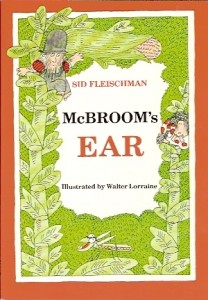
“Pa!” Mary cried. “They didn’t even wait for my prize tomatoes to ripen. They ate them green!”
“Pa!” little Clarinda said. “What happened to your socks?”
I looked down. Glory be! Those infernal [grasshoppers] had eaten the socks right out of my shoes—green socks. All they left were the holes in the toes.
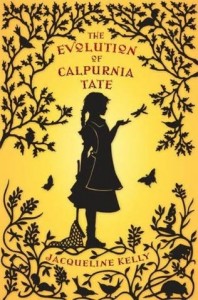
I next wrote in my Notebook that we had two very different kinds of grasshoppers that summer. We had the usual quick little emerald ones decorated all over with black speckles. And then there were huge bright yellow ones, twice as big, and torpid, so waxy and fat that they bowed down the grasses when they landed. I had never seen these before. I polled everyone in the house (except Grandfather) to find out where these odd yellow specimens had come from, but nobody could tell me. Not of them was the slightest bit interested.
As a last resort, I rounded up my courage and went out to my grandfather’s laboratory. I pushed back the burlap flap that served as a door and stood quaking on the threshold. He looked up in surprise from the counter where he was pouring a foul-looking brown liquid into various beakers and retorts. He didn’t invite me in. I stumbled through my grasshopper conundrum while he stared at me as if he was having trouble placing me.
“Oh,” he said mildly, I suspect that a smart young whip like you can figure it out. Come back and tell me when you have.”
Two grasshopper stories: not a coincidence. I started reading Calpurnia to Rose and Beanie today (with Rilla listening in and, after a bit, curled in my lap picking out words Scout Finch-fashion), and when it came time for me to read a story to Rilla, I went straight for McBroom. If I’d thought about it in time, I’d have hunted up Joyful Noise: Poems for Two Voices; there’s a grasshopper poem in there, I’m sure. In fact, I can picture a hopper on the cover. Maybe tomorrow. Today has rolled on to the next thing. Polly Pockets for those three girls, and the Shakespeare kids coming in a bit to work on costumes for our Twelfth Night performance.
Related post: Sciency fiction and nonfiction
More about McBroom: Hoppers
More about Calpurnia Tate: Our first encounter; Naturalists in literature

More book recommendations here.
January 18, 2010 @ 7:44 am | Filed under:
Books I woke up this morning to the happy news that When You Reach Me won the Newbery Award. I was rooting for it! Here’s what I had to say about it in September:
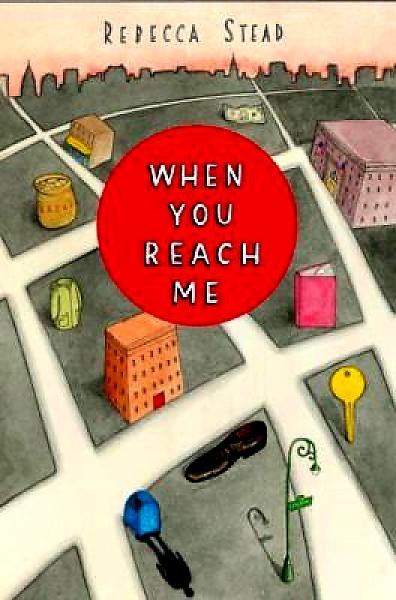 …I want to tell you all about how much I enjoyed Rebecca Stead’s excellent middle-grade novel, When You Reach Me—but if I say anything, practically anything at all, I’ll give away things I’d rather you discovered yourself in the pages of the book, in the perfect way Stead has chosen to reveal them to you. I can say that it’s about a girl who reads A Wrinkle in Time repeatedly, constantly; that her best friend, a boy, abruptly withdraws from her; that her mother is a single, working mom hoping for a chance to shine on $20,000 Pyramid; that it’s 1979; that there’s a mystery; that there are characters I will never forget, completely fresh, completely believable; that I haven’t read a novel that nails the flavor of New York City so perfectly since, gosh, Harriet the Spy. But none of that tells you what I loved most about the book, or what makes it sing, or why I won’t soon forget it. I can’t tell you those things until you’ve read it—and then you won’t need me to, because you’ll know too.
…I want to tell you all about how much I enjoyed Rebecca Stead’s excellent middle-grade novel, When You Reach Me—but if I say anything, practically anything at all, I’ll give away things I’d rather you discovered yourself in the pages of the book, in the perfect way Stead has chosen to reveal them to you. I can say that it’s about a girl who reads A Wrinkle in Time repeatedly, constantly; that her best friend, a boy, abruptly withdraws from her; that her mother is a single, working mom hoping for a chance to shine on $20,000 Pyramid; that it’s 1979; that there’s a mystery; that there are characters I will never forget, completely fresh, completely believable; that I haven’t read a novel that nails the flavor of New York City so perfectly since, gosh, Harriet the Spy. But none of that tells you what I loved most about the book, or what makes it sing, or why I won’t soon forget it. I can’t tell you those things until you’ve read it—and then you won’t need me to, because you’ll know too.
This year’s Newbery Honor books are:
• Claudette Colvin: Twice Toward Justice by Phillip Hoose
• The Mostly True Adventures of Homer P. Figg by Rodman Philbrick
• Where the Mountain Meets the Moon by Grace Lin (we just brought this home home from the library on Saturday; I’d been hearing great things about it)
• The Evolution of Calpurnia Tate by Jacqueline Kelly—here was my response to that one:
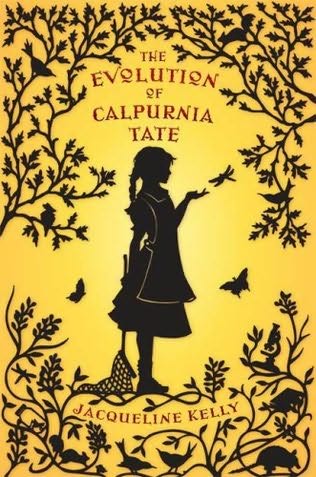 The Evolution of Calpurnia Tate by Jacqueline Kelly. I loved it: this funny, tangy tale of an eleven-year-old girl, surrounded by brothers on a Texas pecan farm in 1899, with a mother yearning for a girly-girl, a fascination with the critters whose doings she records in her very important notebook, and an aloof, bewhiskered grandfather who has never, until now, seemed to notice her existence. I was delighted by the way Callie and her grandfather become acquainted with one another via their mutual interest in the natural world—he’s a correspondent of Charles Darwin and an amateur naturalist and scientist, ever on the lookout for a new species of flora or fauna that might add his name to the rolls of the distinguished discoverers of the day. At first he reacts to Callie rather as if she’s a curious new species herself, and the feeling is mutual. Slowly, they bond…oh, I loved it, the slow revelation of kindred spirits. And meanwhile, there are family antics, and wondrous new technology coming to town (a telephone! an automobile!), and Callie has to figure out how to carve out time for her burning interests when the womenfolk in her life demand piano practice and embroidery and cookery lessons. Certainly there have been many books tackling a girl’s struggles to define and defend her own identity as the people around her seem determined to squeeze her into a mold she isn’t sure fits—I’ve worked with that theme myself, in my Martha books—but I don’t think we’ve ever seen anyone quite like Miss Calpurnia Tate. It’s the setting, the context, that sold me on this book: I’d place it with The Great Brain and Ginger Pye on my mental bookshelf: episodic, comical, historically delicious novels full of eccentric and lovable characters, with that something extra that sets them apart from the crowd.
The Evolution of Calpurnia Tate by Jacqueline Kelly. I loved it: this funny, tangy tale of an eleven-year-old girl, surrounded by brothers on a Texas pecan farm in 1899, with a mother yearning for a girly-girl, a fascination with the critters whose doings she records in her very important notebook, and an aloof, bewhiskered grandfather who has never, until now, seemed to notice her existence. I was delighted by the way Callie and her grandfather become acquainted with one another via their mutual interest in the natural world—he’s a correspondent of Charles Darwin and an amateur naturalist and scientist, ever on the lookout for a new species of flora or fauna that might add his name to the rolls of the distinguished discoverers of the day. At first he reacts to Callie rather as if she’s a curious new species herself, and the feeling is mutual. Slowly, they bond…oh, I loved it, the slow revelation of kindred spirits. And meanwhile, there are family antics, and wondrous new technology coming to town (a telephone! an automobile!), and Callie has to figure out how to carve out time for her burning interests when the womenfolk in her life demand piano practice and embroidery and cookery lessons. Certainly there have been many books tackling a girl’s struggles to define and defend her own identity as the people around her seem determined to squeeze her into a mold she isn’t sure fits—I’ve worked with that theme myself, in my Martha books—but I don’t think we’ve ever seen anyone quite like Miss Calpurnia Tate. It’s the setting, the context, that sold me on this book: I’d place it with The Great Brain and Ginger Pye on my mental bookshelf: episodic, comical, historically delicious novels full of eccentric and lovable characters, with that something extra that sets them apart from the crowd.
SLJ has a list of all this year’s award winners (Caldecott, Printz, Coretta Scott King, etc). Congratulations to all!
Other people’s thoughts, both before and after the awards:
Mother Reader • Semicolon • Educating Alice
Guardian interview with Rebecca Stead:
Stead, who lives in Manhattan with her family, said in an interview with Amazon.com that although she loved A Wrinkle in Time as a child, she hadn’t originally intended to include it in her own prize-winning novel.
“It started out as a small detail in Miranda’s story, a sort of talisman, and one I thought I would eventually jettison, because you can’t just toss A Wrinkle in Time in there casually,” she said. “But as my story went deeper, I saw that I didn’t want to let the book go. I talked about it with my editor, Wendy Lamb, and to others close to the story. And what we decided was that if we were going to bring L’Engle’s story in, we needed to make the book’s relationship to Miranda’s story stronger. So I went back to A Wrinkle in Time and read it again and again, trying to see it as different characters in my own story might (sounds crazy, but it’s possible). And those readings led to new connections.”
September 30, 2009 @ 8:53 pm | Filed under:
Books Why, I wonder, am I so compelled to write about my reading life? I suppose it has something to do with memory, with holding on to things (we recall best those things which we have narrated, as Charlotte Mason was astute enough to recognize), and also with the way putting thoughts into words, written words, shifts vague and swirling impressions to coherent observations, connections, understanding.
Then, too, the urge to talk (write) about books springs also from booklover’s enthusiasm: when I’ve enjoyed something, or even just parts of something, I am eager, eager, eager to share. This creates all sorts of readerly, writerly dilemmas for me: sometimes I start conversations that I can’t squeeze out time to finish (though, in my mind, they are never finished, never closed; and I’m always figuring I’ll have a chance to chime in at some point). Sometimes I want to talk about books that I mostly loved, but I had this one quibble with a plot point, or I thought the ending was weak, or the first-person narrative voice was an unfortunate choice, or—well, any critical observations at all, and if the author is a living person, I find myself completely paralyzed at the prospect of putting my criticism in print. (Which is why, of course, I’m not a book reviewer by trade.)
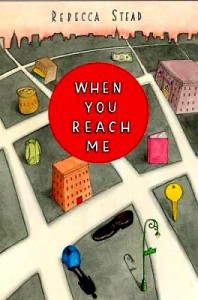 Then, of course, there’s the spoiler problem, over which I’ve sweated here before. For example, I want to tell you all about how much I enjoyed Rebecca Stead’s excellent middle-grade novel, When You Reach Me—but if I say anything, practically anything at all, I’ll give away things I’d rather you discovered yourself in the pages of the book, in the perfect way Stead has chosen to reveal them to you. I can say that it’s about a girl who reads A Wrinkle in Time repeatedly, constantly; that her best friend, a boy, abruptly withdraws from her; that her mother is a single, working mom hoping for a chance to shine on $20,000 Pyramid; that it’s 1979; that there’s a mystery; that there are characters I will never forget, completely fresh, completely believable; that I haven’t read a novel that nails the flavor of New York City so perfectly since, gosh, Harriet the Spy. But none of that tells you what I loved most about the book, or what makes it sing, or why I won’t soon forget it. I can’t tell you those things until you’ve read it—and then you won’t need me to, because you’ll know too.
Then, of course, there’s the spoiler problem, over which I’ve sweated here before. For example, I want to tell you all about how much I enjoyed Rebecca Stead’s excellent middle-grade novel, When You Reach Me—but if I say anything, practically anything at all, I’ll give away things I’d rather you discovered yourself in the pages of the book, in the perfect way Stead has chosen to reveal them to you. I can say that it’s about a girl who reads A Wrinkle in Time repeatedly, constantly; that her best friend, a boy, abruptly withdraws from her; that her mother is a single, working mom hoping for a chance to shine on $20,000 Pyramid; that it’s 1979; that there’s a mystery; that there are characters I will never forget, completely fresh, completely believable; that I haven’t read a novel that nails the flavor of New York City so perfectly since, gosh, Harriet the Spy. But none of that tells you what I loved most about the book, or what makes it sing, or why I won’t soon forget it. I can’t tell you those things until you’ve read it—and then you won’t need me to, because you’ll know too.
 Or how about The Evolution of Calpurnia Tate by Jacqueline Kelly? I loved it: this funny, tangy tale of an eleven-year-old girl, surrounded by brothers on a Texas pecan farm in 1899, with a mother yearning for a girly-girl, a fascination with the critters whose doings she records in her very important notebook, and an aloof, bewhiskered grandfather who has never, until now, seemed to notice her existence. I was delighted by the way Callie and her grandfather become acquainted with one another via their mutual interest in the natural world—he’s a correspondent of Charles Darwin and an amateur naturalist and scientist, ever on the lookout for a new species of flora or fauna that might add his name to the rolls of the distinguished discoverers of the day. At first he reacts to Callie rather as if she’s a curious new species herself, and the feeling is mutual. Slowly, they bond…oh, I loved it, the slow revelation of kindred spirits. And meanwhile, there are family antics, and wondrous new technology coming to town (a telephone! an automobile!), and Callie has to figure out how to carve out time for her burning interests when the womenfolk in her life demand piano practice and embroidery and cookery lessons. Certainly there have been many books tackling a girl’s struggles to define and defend her own identity as the people around her seem determined to squeeze her into a mold she isn’t sure fits—I’ve worked with that theme myself, in my Martha books—but I don’t think we’ve ever seen anyone quite like Miss Calpurnia Tate. It’s the setting, the context, that sold me on this book: I’d place it with The Great Brain and Ginger Pye on my mental bookshelf: episodic, comical, historically delicious novels full of eccentric and lovable characters, with that something extra that sets them apart from the crowd.
Or how about The Evolution of Calpurnia Tate by Jacqueline Kelly? I loved it: this funny, tangy tale of an eleven-year-old girl, surrounded by brothers on a Texas pecan farm in 1899, with a mother yearning for a girly-girl, a fascination with the critters whose doings she records in her very important notebook, and an aloof, bewhiskered grandfather who has never, until now, seemed to notice her existence. I was delighted by the way Callie and her grandfather become acquainted with one another via their mutual interest in the natural world—he’s a correspondent of Charles Darwin and an amateur naturalist and scientist, ever on the lookout for a new species of flora or fauna that might add his name to the rolls of the distinguished discoverers of the day. At first he reacts to Callie rather as if she’s a curious new species herself, and the feeling is mutual. Slowly, they bond…oh, I loved it, the slow revelation of kindred spirits. And meanwhile, there are family antics, and wondrous new technology coming to town (a telephone! an automobile!), and Callie has to figure out how to carve out time for her burning interests when the womenfolk in her life demand piano practice and embroidery and cookery lessons. Certainly there have been many books tackling a girl’s struggles to define and defend her own identity as the people around her seem determined to squeeze her into a mold she isn’t sure fits—I’ve worked with that theme myself, in my Martha books—but I don’t think we’ve ever seen anyone quite like Miss Calpurnia Tate. It’s the setting, the context, that sold me on this book: I’d place it with The Great Brain and Ginger Pye on my mental bookshelf: episodic, comical, historically delicious novels full of eccentric and lovable characters, with that something extra that sets them apart from the crowd.
And I’ve ten times written and deleted a sentence of criticism about one of these two novels, which my what-if-I-hurt-the-writer’s-feelings cowardice will not allow me to keep intact. How’s that for some obnoxious ambiguity?
![]()





